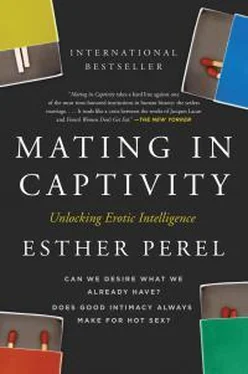To understand Philip’s sexuality, I followed the link to his parents, whose marriage strikingly represented the cultural division between “safe” domesticity and “dangerous” eroticism. While his mother raised five kids, his father engaged in a continuous series of affairs, none of which he made great efforts to hide. Philip’s grandfather, as it turns out, had done the same. “My father, who was actually a very likable man, went about it without much regard for how it made the rest of us feel—least of all my mom,” Philip told me. His mother, whose suffering was severe, was nonetheless a practical woman who never forgot that she had five kids to feed. “She never spoke about it, but we all knew she needed us as much as we needed her.”
In order not to upset her any further, Philip tried to be as different from his father as possible. He became what he calls an asexual wunderkind. “I was intensely moralistic and judgmental,” Philip said ruefully. “On the surface I was the nice, safe guy girls went out with because they knew they could trust me not to take advantage of them; but underneath I was all over the place, and I hated myself for it.” As an adolescent, Philip developed a compelling secret taste for pornography. When he became older, and actual sex became an option, he looked for women he could pick up on the fly for brief, inconsequential one-night stands. “Somehow, those rigid morals just fueled my obsession to break the rules.” For Philip, defiance of ordinary decency was the key to his inner system of arousal. Sex, objectification, and transgression became one. Ironically, by segregating his sexuality outside the boundaries of his relationship with Jackie, Phillip hopes to protect her from the dangers of his desire.
Needless to say, Jackie was very disturbed by the loss of intensity in their sex life. Never very confident about her own magnetism, she, too, had been amazed by Philip’s attraction to her. When it dwindled, she assumed he’d simply lost interest, and that this was to be expected. Growing up with a brother who was in and out of psychiatric institutions, she was accustomed to keeping her own needs to a minimum. She had learned not to impose herself and instead to take what she could get.
While Philip seeks affirmation on the outside, Jackie’s self-affirmation rests solely on him and his response to her. She highlights a common way women order their sexuality, in that she makes him, and his desire for her, the centerpiece of her sexual identity. In the early days, when Philip was all over her, she blossomed. There was no issue. She felt open, daring, sexy, and wanted. Today, a good student of her own childhood, she avoids putting herself out there for fear of rejection. When she does get up the courage to make advances, Philip feels pressure to be responsive and to take care of her. “Whenever Jackie comes on to me, I’m paralyzed,” he confides. “Which heightens Jackie’s insecurity,” I add.
Arguably, male desire runs the gamut between two extremes: those who plead for their partner to come on to them, thereby confirming their desirability; and those who balk when their mate initiates, fearful that their passivity isn’t adequately masculine. Forever unsure of their power as Mom’s little ward, the come-on averse walk a fine line between boyhood and manhood. Predictably, Philip takes Jackie’s overtures as needy demands rather than tempting invitations.
Philip feels guilty because he can’t be more erotically involved with his wife. When I ask him for a sexual image that includes her, he conjures up a picture of the two of them kissing romantically in the sunset. He adds that he has difficulty, now, imagining Jackie in a passionate, erotic way. He tells her openly, “I just can’t see you in my mind as a sexual woman, and I feel bad about it, but it’s the truth.” Philip yearns for ardor with Jackie, but he believes that the tug-of-war within himself won’t allow it. He dreads the rough edge of his desire within the bonds of holy matrimony, and is embarrassed by his need for objectified sex. To his thinking, love is no place for these wanton inclinations.
“You Don’t Do That with Your Wife”
Many of my patients are afraid to express their intense sexual excitement with the one they love and respect. Philip is not alone in hiding his lack of desire behind the decency alibi. You may recognize some of these comments: “I can’t imagine him saying what I want to hear. He’d wonder what happened to his wife.” “I don’t even want to think about, let alone talk about, what I was into before we met.” “I can’t do that with my wife.” Domestic eroticism is wrapped in a veil of appropriateness.
When Philip tells me that Jackie would never go for this stuff, I ask him, “And the stuff is what exactly?” I am prepared for a long list of hard-core kink, and I am surprised when he reveals the basic menu of his sexual imagination. “I’m not one for subtleties. I like the blatant stuff. I like toys, lingerie, porn, a lot of graphic talk. Straightforward, honest fucking.”
“All of which you and Jackie enjoyed before the ring?” I ask.
“Yeah.” He shrugs.
“And now Jackie won’t go for it? Or you won’t go for it with her? I don’t get a sense that she’s changed all that much. But I wonder to what extent you feel that this is not stuff you do with your wife. You seem to believe that it’s wrong to objectify someone you love.”
“Are you saying it’s not?” he asks.
“I’m saying it doesn’t have to be. You know, a lot of couples play with objectification as a way to superimpose otherness on a partner who’s become too familiar. It is often dismissed as lacking intimacy, but I think that when both of you are into it, it’s another kind of closeness. You have to trust people a lot to let yourself forget them.”
We segregate lust for psychological as well as cultural reasons. Any experience of love holds within it a dimension of dependence. In fact, dependence is an essential ingredient of connection. But it’s a producer of terrific anxiety, because it implies that the one we love wields power over us. This is the power to love us, but also to abandon us. Fear—of judgment, of rejection, of loss—is embedded in romantic love. Sexual rejection at the hands of the one we love is particularly hurtful. We are therefore less inclined to be erotically adventurous with the person we depend on for so much and whose opinion is paramount. We’d rather edit ourselves, maintaining a tightly negotiated, acceptable, even boring erotic script, than risk injury. It is no surprise that some of us can freely engage in the perils and adventures of sex only when the emotional stakes are lower—when we love less or, more important, when we are less afraid to lose love. Stephen Mitchell writes, “It is not that romance necessarily fades over time, but it does become riskier.”
Jackie has been listening attentively, and is patiently awaiting her turn. “I hear all this talk about edginess,” she begins, “but with me he’s almost giddy, more like a twelve-year-old boy than a man. It’s hard to really unleash my sexuality with an adolescent. Why does he think he has to go out for this? Maybe I should buy a wig and belly up to the bar,” she jokes.
“Not a bad idea,” I answer.
I-Chat with Your Spouse
I point out that the way Philip has compartmentalized his sexuality, with loving sex at home and hot sex reserved for strangers, has banned eroticism from their relationship. Their repertoire is limited. But he isn’t the only one at fault. For her part, Jackie has transferred her sense of sexual self-worth to him, and I recommend that she take it back. He should not have a monopoly on her sexuality. “Jackie, how long has it been since you flirted?” I ask her. “Can you open yourself up to the eyes of other men, so that Philip isn’t the sole source of your sexual validation?” Philip starts to twitch in his chair.
Читать дальше










